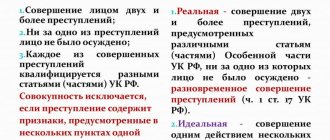An intentional crime, as a type of behavior of an individual, goes through certain stages in its development: from the beginning - the preparatory actions of the subject, to the end - until the immediate onset of socially dangerous consequences. It is worth noting that the stages of committing a crime are an optional part of the act, since the onset of consequences may not be preceded by any stages of the dangerous behavior of the perpetrator. The stages of a crime become part of a criminal act for consideration as a legal subject only when the crime is interrupted - an unfinished criminal activity. In such cases, an assessment of a person’s actions is a necessary action on the part of law enforcement agencies, in order to identify the essence of the issues at what specific stage the crime was interrupted, as well as whether this interruption can be considered voluntary because it occurred for reasons independent of the perpetrator.
The stages of committing a crime are considered only in intentional crimes. Acts that caused harm through negligence and did not have intent on the part of the person who carried them out do not have stages of criminal activity.
Sequence of stages of committing a crime
Types of stages of committing a crime are the sequence of stages in the implementation of a criminal act:
- Stage 1 – planning and forming the intent of the crime. Under the influence of interests generated by surrounding circumstances, a person has an intent to commit a crime, aimed at creating a model of a future crime: setting tasks and goals, choosing means of implementation, thinking about hiding traces of a crime after it has been committed, and more. As a rule, in the process of forming intent, a person hides his intentions, but there are cases when a person discovers intent to commit a criminal act.
- Stage 2 – preparation of a crime. To realize his intentions, a person creates conditions in advance for the successful implementation of his plans: acquiring a crime weapon, searching for accomplices, monitoring the object of a criminal act, etc.
- Stage 3 – implementation of the crime. The final stage, which represents the direct commission of actions aimed at causing harm to the object of criminal activity. The actions of a person, as well as the process of committing a crime, can be either immediate or extended over time.
Upon completion of the creation of conditions, the person directly begins to realize his intentions, which can either be carried out completely and be a completed crime, or not completed due to circumstances beyond the control of the person - then we are talking about unfinished criminal activity. In both cases, the person may be held criminally liable.
Let's look at all the stages of committing a crime in more detail.
Attempted crime
The next stage at which a crime can be interrupted is an attempt. The current criminal law in Part 3 of Art. 30 of the Criminal Code of the Russian Federation defines attempt as intentional actions (inaction) of a person directly aimed at committing a crime, if the crime was not completed due to circumstances beyond the control of this person. Almost the only innovation that the legislator has introduced into the definition of an attempt is to take into account the fact that an attempt can also be committed through inaction. An example of this could be leaving a person helpless in the cold, a mother refusing to feed her child, etc. When attempting a crime, there are a number of signs that distinguish it from preparation and thus make it a more dangerous stage in the implementation of the crime.
Firstly, an attempt is already a direct invasion of the object of the crime, a rupture of the legal shell that protects this or that benefit from encroachment. Secondly, an attempt, in contrast to preparation, is already the beginning of the implementation of the objective side of a specific crime provided for by the Special Part of the Criminal Code of the Russian Federation. The incompleteness of the objective side of an attempt is expressed in the vast majority of cases by the non-occurrence of a criminal result, the consequences of committing a crime. In some situations, failure to complete a crime may result in failure to commit a number of actions included in the objective side of the crime.
In terms of its objective and subjective aspects, an attempt is characterized by the following features: firstly, the actions of the perpetrator are directly aimed at committing a crime; secondly, the crime started was not completed; thirdly, the crime was not completed due to circumstances beyond the will of the perpetrator.
The first sign makes it possible to distinguish between preparation and attempted crime, while the second and third distinguish between attempted and completed crime.
When considering an attempt, it is necessary to keep in mind that it is already the execution of a crime, the implementation of a socially dangerous act (actions or inaction), which is a mandatory sign of an objective party, which is directed against the object of the crime.
The incompleteness of the crime during an attempt is interpreted as the absence in the objective side of the crime of the necessary signs provided for by the disposition of a specific criminal law norm of the Special Part of the Criminal Code of the Russian Federation.
First of all, this is the non-occurrence of a criminal result (a missed shot, a glancing blow with a knife, etc.).
Often in the practice of qualifying attempts, there are cases when consequences do occur, but not those that the criminal expected from the committed act. For example, as a result of an attack on life, it was not the death of the victim, but serious harm to health.
The reasons for not completing a crime must be objective. If the perpetrator at the stage of the attempt voluntarily refuses to complete the crime, then this kind of action is subject, if the necessary signs are present, to an independent criminal legal assessment (Article 31 of the Criminal Code of the Russian Federation).
The will of the perpetrator is aimed at committing a crime, bringing it to an end, achieving a criminal result. The reasons that act as a kind of barrier can be the resistance of the victim, the action of mechanisms and forces of nature, the lack of certain skills of the offender, his confusion regarding the various circumstances of the act committed.
From the subjective side, an attempt is only an intentional act, and the intent can only be direct. The offender is aware of the danger of the act being committed, as well as the fact that he has performed or failed to perform the necessary actions that will lead to a criminal result.
The principle of subjective imputation operating in Russian criminal law makes it possible, based on the different content of the intellectual moment of an attempt, to distinguish its two types - unfinished and completed attempt. This need arises due to the fact that awareness of the degree of incompleteness or completion of the crime significantly changes the color of the committed act and can be taken into account by the court when determining the type and amount of punishment.
An unfinished attempt occurs when, at the time of its commission, the perpetrator realizes that he did not complete all the necessary actions that would lead to the criminal result. For example, a criminal entered a protected area for the purpose of stealing, but was detained by a security officer.
A completed attempt is characterized by the fact that the perpetrator, in accordance with his subjective ideas, is aware that he performed the necessary list of actions, but they did not lead to the onset of consequences.
In the science of criminal law, within the framework of the doctrine of the stages of committing an intentional crime, a third type is also considered, the so-called. "unworthy assassination attempt." This type covers cases when the offender is mistaken about the actual properties of an object or the means or instruments of committing a crime.
In accordance with this classification, a distinction is made between an attempt on an unsuitable object and an attempt with unsuitable means. Examples of such types of assassination attempts include cases of shooting or stabbing an already dead person, attempting to fire from an unusable gun, failure to detonate an explosive device, etc.
Both of these types are essentially a type of factual error. In the theory of criminal law, cases of attempt are considered using unsuitable means, chosen due to extreme ignorance or associated with superstition. The essence of this attempt is that a person is trying to cause harm by attracting supernatural forces (spells, magical actions, etc.) or with the help of objects that, due to their natural properties, cannot cause the desired harm. The literature gives an example of an attempted poisoning using dried meat of a poisonous snake. This type of attempt is more similar to the detection of intent and therefore does not entail criminal liability.
Thus, part 3 of Art. 30 of the Criminal Code of the Russian Federation, along with the articles of the Special Part of the Criminal Code of the Russian Federation, acts as a legal basis for bringing to criminal responsibility a person who attempted to commit an intentional crime. Taking into account the incompleteness of the act, the law obliges the courts, when imposing punishment for an attempt, not to go beyond three quarters of the maximum term or the amount of the most severe type of punishment provided for by the sanction of the article of the Special Part of the Criminal Code of the Russian Federation (Part 3 of Article 66 of the Criminal Code of the Russian Federation). The death penalty or life imprisonment cannot be imposed for attempted murder (Part 4 of Article 66 of the Criminal Code of the Russian Federation).
Formation and detection of intent
Modern criminal law recognizes the initial stage of committing a crime as unpunished, that is, actions such as the formation of intent to commit a crime do not entail criminal liability under the Criminal Code of the Russian Federation. The whole point is that the formation of intent is an internal mental process of a person that has no subsequent actions and does not pose a threat to public safety. Even the discovery of intent, not supported by specific actions of a person, cannot become the subject of legal assessment, since no real harm is created to the object of the crime, and therefore there can be no talk of a public danger.
Important! It should be noted that the detection of intent should not be confused with crimes provided for in the articles of the Criminal Code of the Russian Federation, which have an independent composition and specific forms of mental influence on other persons. So, for example, Article 119 of the Criminal Code of the Russian Federation recognizes such a criminal act as a threat to kill or cause grievous harm to health, if at the same time, the victim had reason to fear that this threat would be carried out.
Subjective criteria for a completed crime
The subjective criterion helps to distinguish between actually completed crimes and unfinished crimes that contain signs of another completed crime. The introduction of the designated criterion into the concept under consideration, according to them who adhere to this point of view, will make it possible to correctly qualify some acts. For example, if a subjective criterion is introduced into the concept of a completed crime, it will be impossible to qualify cases of causing grievous bodily harm during attempted murder under the article on intentional infliction of grievous bodily harm. The intent was aimed at causing death, but the consequences did not occur due to circumstances beyond the control of the person; there is an attempt at murder, not causing harm to health. In this case, only the direction of intent will make it possible to distinguish between these crimes.
However, this position is objectionable for several reasons. Firstly, not only intentional crimes can be recognized as completed, but also careless ones. Secondly, in the course of qualification, when establishing the presence of all the signs of a crime in an act, it is necessary to determine the signs of the subjective side, including the direction of intent, which is duplicated when introducing a subjective criterion.
It turns out that in the process of qualification it is necessary to establish the identity of the same characteristics twice: when determining the content of intent, deciding whether the act contains elements of a crime, and also when deciding whether the crime has reached the moment of its completion. Thirdly, a subjective criterion will not always help to correctly qualify cases of causing less harm during an attempted crime. The rule regarding the qualification of an act as an attempt when the intent is partially realized is not always applicable.
So, if, when committing a crime, a person intended to cause greater consequences, but in fact lesser consequences occur, although within the framework of one qualifying characteristic. For example, a person intended to steal 900,000 rubles, and property damage from the crime due to circumstances beyond the person’s control amounted to 300,000 rubles. In this case, incomplete implementation of intent will not change the qualification.
In Part 1 of Art. 29 of the Criminal Code of the Russian Federation stipulates that a completed crime is understood as an act that contains all the elements of a crime provided for by the Criminal Code of the Russian Federation. From which we can conclude that the legislator, when constructing the norm in question, took a formal approach and limited himself to an objective criterion.
Preparing for a crime
In accordance with Part 1 of Art. 30 of the Criminal Code of the Russian Federation the following are recognized as preparation for a crime:
- finding and manufacturing weapons and means of committing a crime: a crime weapon is understood as solid objects with a certain striking ability, weapons; under funds - documents, substances and objects (for example, a fake power of attorney to receive funds);
- finding accomplices in the crime;
- conspiracy of a group of persons to commit a crime;
- other conditions that are intentional, if the crime was not completed due to circumstances beyond the control of the person carrying it out.
When preparing to carry out a crime, a person for the first time performs specific actions aimed at ensuring a criminal act in the future, that is, he begins the practical implementation of his criminal plan. Preparation for a crime can consist both in the actions of a person who has the intent to commit a criminal act, and in his inaction.
Important! According to the Criminal Code of the Russian Federation, responsibility for preparation for a criminal act occurs only for crimes of a grave and especially grave nature; in other cases, this stage is not punishable.
Differences between unfinished and completed crimes
A completed crime is a socially dangerous act containing all the signs of a crime provided for by the Criminal Code of the Russian Federation. We have already completed coursework
Criminal executive law in more detail. In a completed crime, the actions of the attacker are completed, and in an unfinished crime, they are interrupted for certain reasons.
The most significant feature that distinguishes the two types of crimes from each other is the full implementation of the objective and subjective aspects of a socially dangerous act provided for by criminal law. A completed crime is characterized by full compliance of the crime with the characteristics specified in the law. When the guilty person realizes the objective and subjective aspects of a criminal act, it is considered completed.
Crimes with material elements are considered completed when the victim has suffered real harm, which was the target of the attacker.
In crimes with formal elements, the moment of their end is the commission of the act, regardless of whether it entailed socially dangerous consequences. For example, robbery is considered a completed crime from the moment of the attack, and in this case the theft of someone else's property is not considered the determining moment in the completion of this crime.
Implementation of the crime
Specific actions of a person directly aimed at carrying out criminal intent using previously preparatory actions is the stage of implementation of the crime, which can be divided into two types: attempted crime (unfinished crimes) and completed crime. A crime is considered completed when the act committed by a person contains all the elements of a crime provided for by law. In this case, what matters is the person’s implementation of all the socially dangerous actions he has planned, and, accordingly, the onset of socially dangerous consequences. When a crime is completed, the person who committed it bears full criminal liability provided for by the criminal legislation of the Russian Federation. An attempted crime is a criminal act that is not completed by a person due to circumstances beyond the control of the person who carried it out. Attempt is divided into:
- completed - when the perpetrator is convinced that he did everything to complete the crime, but the criminal result did not follow due to circumstances beyond his control;
- unfinished - when the perpetrator, for reasons beyond his control, did not complete all the actions necessary to complete the crime.
In addition, criminal law distinguishes such a concept as “unsuitable attempt”, when the reason for not carrying out the crime to its logical conclusion is the factual mistake of the perpetrator in the object or means of committing the crime. Let us note that an unworthy attempt entails criminal liability if we are not talking about the use of means that are obviously incapable of causing harm to the object of the crime.
The concept of an unfinished crime and its signs
In accordance with Article 14 of the Criminal Code of the Russian Federation, a crime is a socially dangerous act committed guilty of guilt, prohibited under threat of punishment.
The elements of crimes are formulated in the Criminal Code of the Russian Federation. We have already completed our thesis
Art.
313 of the Criminal Code of the Russian Federation in more detail as completed criminal actions (or inaction). But in real life, the plans of attackers are not always completed. Are you an expert in this subject area?
We invite you to become the author of the Directory. Working conditions. The following three stages of crime development are distinguished:
- preparation for a crime;
- attempted crime;
- completed crime.
The first two stages constitute an unfinished crime, which is also called pre-criminal activity. An unfinished crime is an action aimed directly at committing a socially dangerous act, but stopped for certain reasons. In criminal practice, there are two types of unfinished crimes:
- interrupted due to circumstances beyond the control of the guilty person;
- interrupted by the will of the offender (voluntary refusal to carry out malicious intent to the end).
Note 1
Thus, preparation and attempt are types of crimes interrupted due to circumstances beyond the control of the offender. A crime not completed voluntarily differs significantly from them. Moreover, the motives of the person who refused to complete the malicious intent can be very different.
Finished works on a similar topic
Course work Completed and unfinished crime 460 ₽ Abstract Completed and unfinished crime 230 ₽ Test paper Completed and unfinished crime 240 ₽
Receive completed work or specialist advice on your educational project Find out the cost
An unfinished crime is characterized by incomplete implementation of actions provided for by the characteristics of a specific crime, or the absence of its consequences. Therefore, the basis for bringing a person to criminal liability arises if the activity of this subject was interrupted before the end of the encroachment due to circumstances beyond his control.
Preparation and attempt form a crime in which the signs of the objective side of a socially dangerous act are not fully manifested. When preparing, they are expressed in creating conditions for the successful commission of a criminal act; during an attempt, they are expressed in an attempt to cause harm.
Accurate determination of the signs of an unfinished crime is of great importance for establishing the grounds for bringing the guilty person to criminal responsibility, as well as for the correct qualification of the crime and the individualization of punishment.
Internet exchange of student works">
Figure 1. Stages of committing a crime. Author24 - online exchange of student work
Responsibility for an unfinished crime
Part 3 of Article 29 of the Criminal Code of the Russian Federation provides for criminal liability for attempted crime under an article of the Code that regulates liability for a similar completed crime, but with reference to Article 30 of the Criminal Code of the Russian Federation. So, for example, for attempted murder under aggravating circumstances, the court may qualify the act under paragraphs. “g” and “d” part 2 art. 105 and part 3 of Art. 30 of the Criminal Code of the Russian Federation, which will make it possible to determine the punishment for the perpetrator within the sanctions of Part 2 of Art. 105 of the Criminal Code of the Russian Federation, taking into account the norms of Art. 60 of the Criminal Code of the Russian Federation and other provisions of the Code. Article 66 of the Criminal Code of the Russian Federation establishes that when assigning punishment for an unfinished crime, it is necessary to take into account the circumstances that contributed to the crime not being brought to its logical conclusion. The article also notes that:
- the term and amount of punishment for preparation for a crime cannot exceed 1/2 the term of the most severe type of punishment, which is provided for in an article of the Criminal Code of the Russian Federation for a completed crime;
- the term and amount of punishment for attempted crimes cannot exceed 3/4 of the maximum term of the most severe type of punishment, which is provided for in an article of the Criminal Code of the Russian Federation for a completed crime.
In addition, the Code does not provide for the imposition of such types of punishment as life imprisonment and the death penalty for preparation for a crime. Let us remind you that the Russian Code does not provide for criminal liability for preparation for a crime of minor or medium gravity.
Types of crimes
- Crimes of minor gravity are recognized as intentional and careless acts, for the commission of which the maximum punishment does not exceed three years of imprisonment (Part 2 of Article 16 of the Criminal Code of the Russian Federation).
- Crimes of medium gravity are recognized as intentional acts, for the commission of which the maximum punishment does not exceed five years of imprisonment, and careless acts, for the commission of which the maximum penalty does not exceed ten years of imprisonment (Part 3 of Article 16 of the Criminal Code of the Russian Federation).
- Serious crimes are considered intentional acts, for the commission of which the maximum punishment does not exceed ten years of imprisonment, and careless acts, for the commission of which the maximum penalty does not exceed fifteen years of imprisonment (Part 4 of Article 16 of the Criminal Code of the Russian Federation).
- Particularly serious crimes are intentional acts, the commission of which is punishable by imprisonment for a term of over ten years or a more severe punishment (Part 5 of Article 16 of the Criminal Code of the Russian Federation).
Depending on the moment of completion of the crime, the signs of which are defined in the disposition of the Special Part of the Criminal Code, three types of completed crimes are distinguished:
- a completed crime with a formal composition;
- completed crime with material components;
- a completed crime with a truncated composition.
A formal crime is considered completed from the moment the action itself is committed.
A crime with material elements is considered completed when the consequences specified in the disposition of the article of the Criminal Code of the Russian Federation occur.
A crime with a truncated composition occurs where the law “transfers” the moment of completion of the crime to the stage of preparation or attempt. For example, in accordance with Art. 276 of the Criminal Code of the Russian Federation (“Espionage”), the crime is recognized as completed not only when transmitting information constituting a state secret, but also when collecting it.
Of course, when we talk about a crime, we mean its final stage, that is, the actions of a person have all the signs of a crime. However, life is much more complicated and the crime intended by a person may not be completely committed.
For example, a thief who tried to break into an apartment was detained; the killer, by shooting at the victim, only wounds him, etc. Therefore, the question of responsibility arises not only when a crime is completed, but also in preparation for a crime, an attempt to commit it.
In this regard, the question arises about the stages of committing a crime, which are understood as certain stages of preparation and implementation of an intentional crime, differing from each other in the nature of the actions committed and in the moment of cessation of criminal activity.
Types and stages of criminal offense







